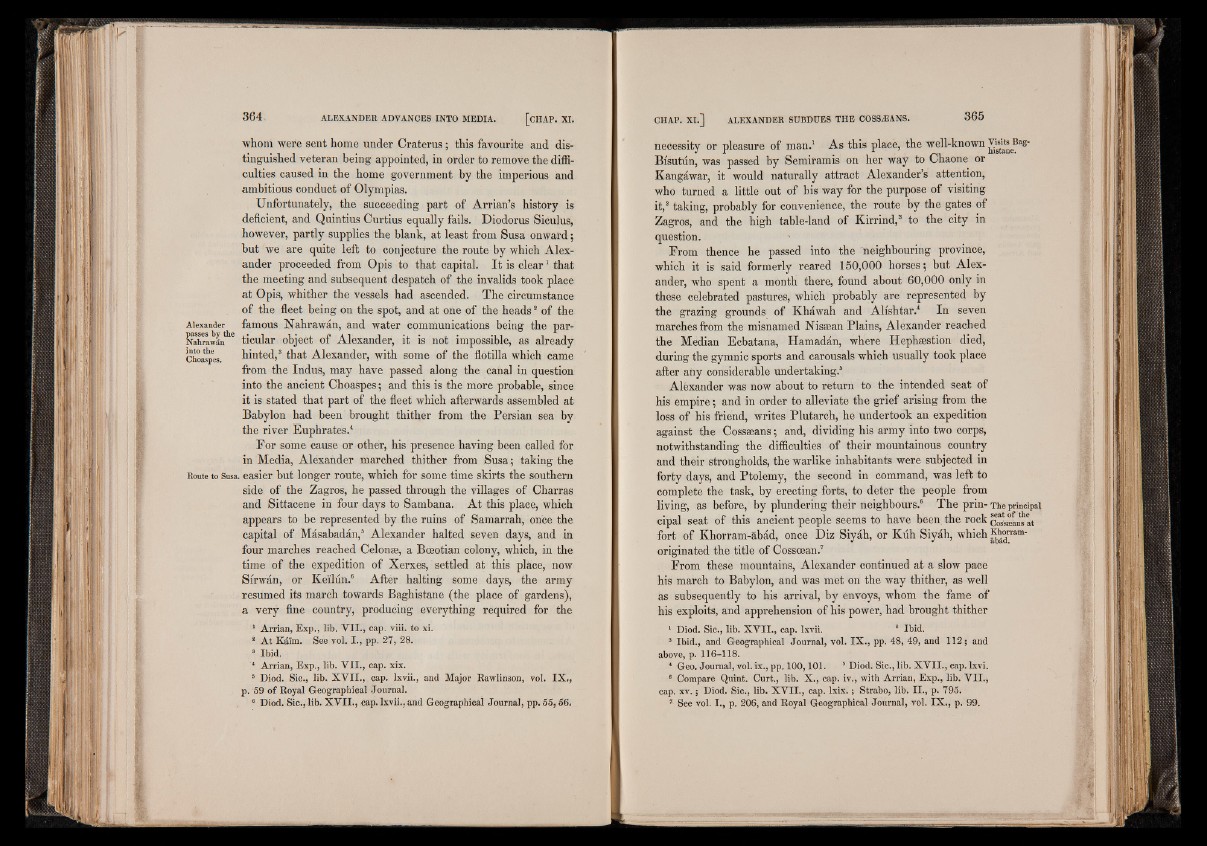
Alexander
passes by the
Nahrawân
into the
Choaspes.
whom were sent home under Craterus; this favourite and distinguished
veteran being appointed, in order to remove the difficulties
caused in the home government by the imperious and
ambitious conduct of Olympias.
Unfortunately, the succeeding part of Arrian’s history is
deficient, and Quintius Curtius equally fails. Diodorus Siculus,
however, partly supplies the blank, at least from Susa onward;
but we are quite left to conjecture the route by which Alexander
proceeded from Opis to that capital. It is clear1 that
the meeting and subsequent despatch of the invalids took place
at Opis, whither the vessels had ascended. The circumstance
of the fleet being on the spot, and at one of the heads2 of the
famous Nahrawan, and water communications being the particular
object of Alexander, it is not impossible, as already
hinted,3 that Alexander, with some of the flotilla which came
from the Indus, may have passed along the canal in question
into the ancient Choaspes; and this is the more probable, since
it is stated that part of the fleet which afterwards assembled at
Babylon had been brought thither from the Persian sea by
the river Euphrates.4
For some cause or other, his presence having been called for
in Media, Alexander marched thither from Susa; taking the
Route to Susa, easier but longer route, which for some time skirts the southern
side of the Zagros, he passed through the villages of Charras
and Sittacene in four days to Sambana. At this place, which
appears to be represented by the ruins of Samarrah, once the
capital of Masabadan,5 Alexander halted seven days, and in
four marches reached Celonse, a Boeotian colony, which, in the
time of the expedition of Xerxes, settled at this place, now
Sirwan, or Keilun.6 After halting some days, the army
resumed its march towards Baghistane (the place of gardens),
a very fine country, producing everything required for the
* Arrian, Exp., lib. V I I ., cap. viii. to xi.
* A t Kd'im. See vol. I ., pp. 27, 28.
8 Ibid.
4 Arrian, Exp., lib. V I I ., cap. xix.
5 Diod. Sic., lib. X V I I .,. cap. lxvii., and Major Rawlinson, vol. IX ,,
p. 59 of Royal Geographical Journal.
6 Diod. Sic., lib. X V I I ., cap. lxvii., and Geographical Journal, pp. 55,56.
necessity or pleasure of man.1 As this place, the well-known ^¿t3eBag'
Bisutun, was passed by Semiramis on her way to Chaone or
Kangawar, it would naturally attract Alexander’s attention,
who turned a little out of his way for the purpose of visiting
it,2 taking, probably for convenience, the route by the gates of
Zagros, and the high table-land of Kirrind,3 to the city in
question.
From thence he passed into the neighbouring province,
which it is said formerly reared 150,000 horses; but Alexander,
who spent a month there, found about 60,000 only in
these celebrated pastures, which probably are represented by
the grazing grounds of Khawah and Alishtar.4 In seven
marches from the misnamed Nissean Plains, Alexander reached
the Median Ecbatana, Hamadan, where Hephsestion died,
during the gymnic sports and carousals which usually took place
after any considerable undertaking.6
Alexander was now about to return to the intended seat of
his empire; and in order to alleviate the grief arising from the
loss of his friend, writes Plutarch, he undertook an expedition
against the Cossseans; and, dividing his army into two corps,
notwithstanding the difficulties of their mountainous country
and their strongholds, the warlike inhabitants were subjected in
forty days, and Ptolemy, the second in command, was left to
complete the task, by erecting forts, to deter the people from
living, as before, by plundering their neighbours.6 The prin- The principal
cipal seat of this ancient people seems to have been the rock cossaans'at
fort of Khorram-abad, once Diz Siyah, or Kuh Siyah, which Khorram-
originated the title of Cossrean.7
From these mountains, Alexander continued at a slow pace
his march to Babylon, and was met on the way thither, as well
as subsequently to his arrival, by envoys, whom the fame of
his exploits, and apprehension of his power, had brought thither
1 Diod. Sic., lib. X V II., cap. lxvii. 2 Ibid.
3 Ibid., and Geographical Journal, vol. IX ., pp. 48, 49, and 112; and
above, p. 116-118.
* Geo. Journal, vol. ix., pp. 100,101. 5 Diod. Sic., lib. X V I I ., cap. lxvi.
6 Compare Quint. Curt., lib. X., cap. iv., with Arrian, Exp., lib. V I I .,
cap. x v .; Diod, Sic., lib. X V I I ., cap. lx ix .; Strabo, lib. I I ., p. 795.
7 See vol. I ., p. 206, and Royal Geographical Journal, vol. IX ., p. 99.